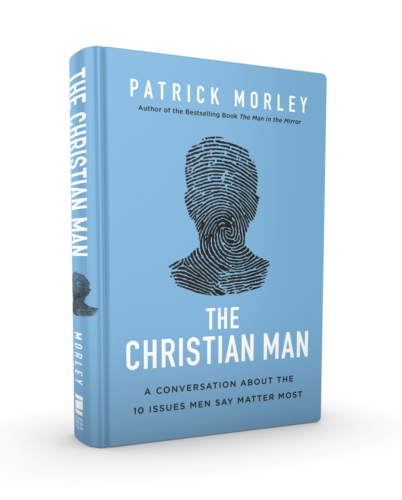The Christian Man - Who is he?
“No man fails on purpose. Quite the opposite. When our feet hit the floor every morning,
we’re looking for a win.” - Patrick Morley
Patrick Morley wrote The Christian Man: A Conversation About the 10 Issues Men Say Matter Most, to address the overwhelming thoughts of failure many Christian men feel as they attempt to live out biblical manhood.
This is week 5 of 52 in my reading plan from Tim Challies, and this week was meant to be “A book targeted at your gender.”
Something unique about this book is that it started with a small group.
Morley conducted a brainstorming session between 24 men, diverse in age, race, background, and culture heritage, which sought to identify the top issues that Christian men face daily. The results of their brainstorming session are as following in order:
Patrick Morley
author of The Christian Man
Identity
Life Balance
Growth
Marriage
Children
Friendships
Work
Lust
Culture
Sharing my Faith
These 10 issues make up the 10 different chapters in The Christian Man, and Morley seeks to provide
the biblical perspective on how to get a win in each category.
Biblical manhood is an often-discussed topic. Unfortunately, most conversations, papers, and books engage the discussion from either a theological or practical perspective, rarely presenting the two in unison.
To Morley’s credit, he attempts to do just that. He theologically and practically addresses all ten issues every man will face. Morley combines his diverse experiences as a veteran, business owner, social justice advocate, successful author, biblical scholar and preacher to bring an existential perspective to his theological
positions.
With that, let me dive into the Good and Bad of The Christian Man.
The Good
1. Focus on Discipleship
Morley doesn’t treat discipleship with a laissez-faire attitude. He stresses that discipleship doesn’t have tiers of great and greater, but is in itself the greatest title a man can receive.
He writes, “To be a disciple is the highest honor to which a man can aspire” (p. 33).
In his chapter on Growth, he identifies how we know God through the process of discipleship. This is the way God has ordained for us to encounter his teachings, know his person, and to sharpen each other for the work he has in store for us.
One of my favorite one-liners from the book is when he says, “Evangelism without discipleship is cruel.”
To tell someone about the goodnews of Jesus Christ, without any desire or plan to lead them into a rich knowledge of God, his teachings, and at minimum, an introduction in the relational community of the church is simply cruel.
2. Readable and Engaging
At no point in The Christian Man will you be bored.
Notice I am not saying you will agree with everything. I hope you don’t. But you will not find yourself skipping large sections, or just wanting this to end so you can get on with the next book.
The issues that Morley and his team identify are real.
Every Christian man wrestles with identity. Work. Marriage. Kids. Growth. Balance. Friendships. Lust. Culture. Evangelism. The question is, do we admit it or not?
The beauty of ignorance is if we never ask the question and investigate an objective standard then we never fail. The lie of ignorance is that a standard has already been declared and addressed in God’s word. And his word is binding.
Men of all different generations will find this book’s chapter subjects both true and challenging, while equally easy to follow and engaging.
3. Theologically Rooted
Make no mistake, The Christian Man is rooted not merely in one man’s opinion, but the legacy of orthodox Christianity.
Morley quotes legendary men of faith such as Tertullian, Augustine, Chrysostom, Calvin, Luther, Edwards, and others to drive home consistent historically held positions on the theology of biblical manhood.
At the same time, Morley does not profess a specific theological camp. While there are clear references and hints toward a Wesleyan system of thought, he addresses concepts from both multiple theological vantage points.
I do not believe this is because Morley is unconvinced or unconvinced, but simply because he desires to hit the heart of biblical manhood and not let titles get in the way of his reader.
While I appreciate his commitment to the gospel and to ministering to Christian men, I believe this positive aspect also produces two potential negatives for readers who do not approach this book with proper expectations.
The Bad:
First, know this book is written superbly and addresses critical aspects regarding biblical manhood. However, I cannot ignore the two areas of refinement. If the reader goes into The Christian Man recognizing these two discrepancies, then it will significantly improve their enjoyment, conviction, and encouragement of the
book by providing correct expectations before flipping the pages.
1. The Definition of Disciple
Morley has a confident and passionate position on the necessity of discipleship in the church. He provides a brief historical and grammatical overview of the word disciple. But unfortunately, like many authors and Pastors, his definition does not go far enough.
In his chapter on Growth, he says,
“To be a Christian and not be discipled into “the teachings” is like a man joining the army and being issued a rifle that he never learns how to clean and shoot. He will not be of much use to himself or those around him on the day of battle.” (p. 67).
I get his point. But by saying this Morley makes discipleship an option. You can be a Christian and not engage in discipleship, he says. You may not be very useful, but you can do it.
Not only is this position never mentioned, hinted at, or inferred in scripture, but Jesus teaches against it. I won’t rewrite my book SOLD here, but for brevity, consider the commands and statements made in Luke 14:25-33, John 8:31-32, John 13:34-35, and John 15:8.
Reading the book with this in mind will help chew on the rich meat of Morley’s writing while not being caught off guard by the bones.
2. Snorkeling rather than Scuba
Lastly, if you understand that The Christian Man is a snorkeling excursion, rather than a scuba dive, you will be much more encouraged and convicted by its content.
If you haven’t snorkeled before, it is truly an awesome time. Floating on the water's surface you can admire the beauty of the sea life around you. And if you spot something truly magnificent, you can dive down for a closer intimate look. Unfortunately, you can’t stay too long, because you will eventually pass out and die. You need air!
Scuba, on the other hand, is different. While you do not have the long-range perspective of snorkeling, you have a completely new perspective of being completely submersed and in the natural habitat of the underwater life around you. If you want to go into a cave, lift a rock, wander into a ship wreckage, you can! And the wonders you experience face to face with the big blue leave a lasting impression.
The Christian Man is a snorkel excursion rather than a scuba dive. It has awesome aspects that make it completely worth your time and energy, even worth a little sunburn. But it lacks what comes from submersion into the rich aspects of theological thinking.


